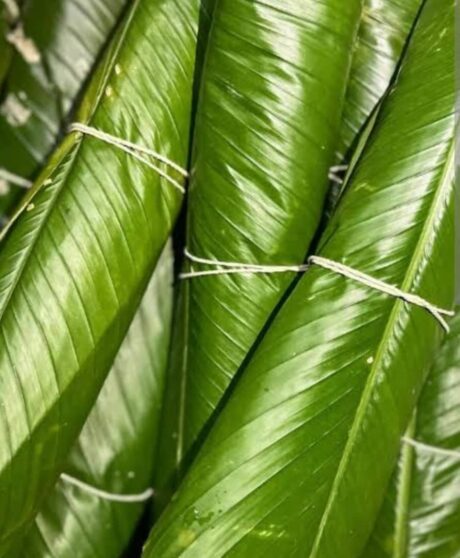Okasi (Afang Leaves) – per pack (Subscriber price only)
Description
Okasi, also called Afang leaves, is a popular leafy vegetable native to the Efik and Ibibio people of Southern Nigeria. It is a tough, slightly bitter leaf often sliced thinly and combined with waterleaf to balance its flavor and texture. Afang leaves are traditionally used in thick, hearty soups and are well-known for their rich, earthy taste.
Sources
Akwa Ibom State, Cross River State, and parts of Rivers State.
Health benefits
-
Rich in dietary fiber – aids digestion and supports gut health.
-
High in protein for a leafy vegetable – supports muscle repair and growth.
-
Contains essential minerals like calcium and magnesium – promotes strong bones and teeth.
-
Rich in antioxidants – helps protect the body from oxidative stress.
-
Boosts iron levels – supports red blood cell production and prevents anemia.
Common soups you can use it for
-
Afang Soup (Efik/Ibibio specialty)
-
Edikang Ikong Soup
-
Vegetable Okra Soup
-
Mixed Vegetable Soup with assorted meats and fish
Uziza -per pack(Subscriber price only)
Description
Uziza (Piper guineense) is a fragrant, peppery leaf and seed plant native to West Africa. The leaves have a slightly bitter and spicy taste, while the seeds are pungent with a distinct aroma. In Nigerian cooking, the leaves are used fresh or dried to add depth and spice to soups and stews.
Sources
Primarily cultivated in Southeastern Nigeria, especially in states like Enugu, Abia, Imo, Anambra, and Ebonyi.
Health benefits
-
Aids digestion – helps relieve constipation and bloating.
-
Anti-inflammatory – soothes body pains and inflammation.
-
Boosts immunity – contains vitamins, minerals, and essential oils that fight infections.
-
Improves reproductive health – traditionally believed to boost fertility and sexual health.
-
Rich in dietary fiber – supports gut health.
Common soups you can use it for
-
Nsala Soup (White Soup)
-
Oha Soup
-
Pepper Soup
-
Egusi Soup (especially the Southeastern variation)
-
Okra Soup with mixed leaves
MoinMoin Leaves – per pack -(Subscriber price only)
Description
Moi Moi leaf comes from the plant Thaumatococcus daniellii, known for its broad, flexible, and aromatic leaves. These leaves are not eaten but are used as natural wrappers for steaming dishes like Moi Moi (bean pudding) and some local rice delicacies. Cooking with Moi Moi leaves gives food a distinct earthy aroma and flavor compared to using nylon or foil.
Sources
Oyo, Ogun, Ondo, and Ekiti, as well as parts of the South-South.
Health benefits (indirect — since the leaves are not consumed directly)
-
Adds a natural aroma to food without artificial flavoring.
-
Eco-friendly and biodegradable compared to synthetic wraps.
-
Helps retain food nutrients during steaming due to its natural sealing effect.
-
The plant itself has medicinal uses in traditional medicine (e.g., the fruits are used as natural sweeteners).
Common soups or dishes you can use it for
-
Moi Moi (bean pudding)
-
Ekuru (steamed mashed beans)
-
Some local steamed rice dishes
WaterLeaf- per pack (Subscriber price only)
Description
Waterleaf (Talinum triangulare) is a soft, juicy, and nutrient-rich leafy vegetable popular in Nigerian cuisine. It has small, smooth leaves and a slightly tangy flavor that blends well with other vegetables. Known as Gbure in Yoruba, Mgbolodi in Igbo, and Alenyru in Hausa, waterleaf is often used fresh in soups and stews. It is a key ingredient in many vegetable-based Nigerian dishes and is also valued for its numerous health benefits.
Sources
Commonly cultivated in home gardens and farmlands across Nigeria, especially in the southern and middle belt regions. It grows abundantly during the rainy season but can be cultivated year-round with adequate watering.
Health Benefits
-
Rich in vitamins A and C for improved vision and immune function.
-
High in dietary fiber, which supports digestion and bowel health.
-
Lowers cholesterol and promotes heart health.
-
Contains antioxidants that help fight free radicals in the body.
-
Aids weight management due to its low calorie and high water content.
Common soups or dishes you can use it for
-
Edikang Ikong soup
-
Afang soup
-
Vegetable yam porridge
-
Stir-fried vegetable sauce
-
Waterleaf and okra soup









